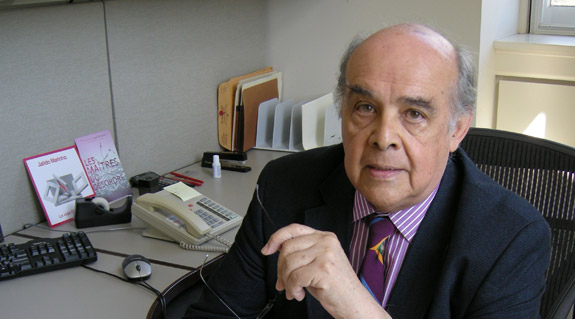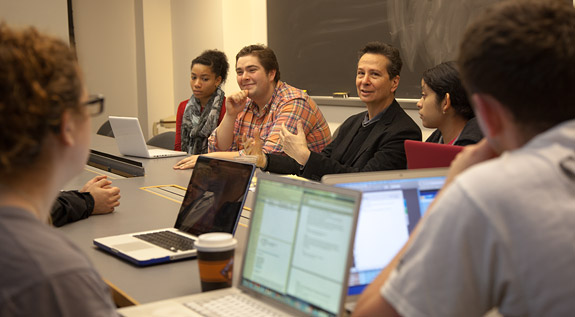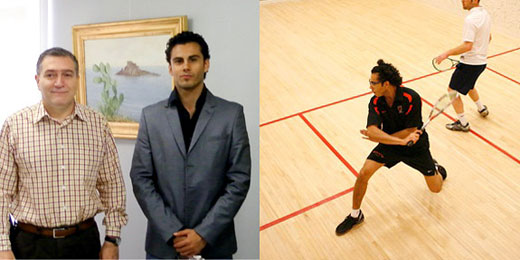As an undergraduate, I had a Classics professor who sometimes spoke of the humanities’ task as the search for the strange in the familiar, and the familiar in the strange. The idea stuck with me, and in my own classes I have attempted to create an environment in which students re-evaluate their preconceived notions, and simultaneously establish connections to what may seem remote or exotic. Since most of my courses revolve around the cultural histories of cities, normally this is a rather safe exercise. How might a 19th-century urban dweller find our sartorial habits unusual? How might we draw parallels between Brasília’s development and that of more traditional capitals?
Author Archives: Kai Laidlaw
University of São Paulo, Princeton to launch strategic partnership this fall
Next fall, five years after President Shirley Tilghman published the fall 2007 report “Princeton in the World,” which delineated measures for expanding the University’s international presence, the University will announce a formal academic partnership with the University of Sao Paulo in Brazil, according to history professor and Council for International Teaching and Research Director Jeremy Adelman.
Between 2012 and 2015, Princeton and USP faculty will study “Race and Citizenship in the Americas,” supplemented by a series of major yearly conferences and smaller workshops with faculty and students at the schools, according to the project proposal announced Thursday. The project will facilitate the hosting of graduate schools at the two universities, with the ultimate goal of “strengthen[ing] and broaden[ing] Princeton’s academic and institutional ties with Brazil.”
Ambassador Ricardo Luna, PLAS visiting fellow
Ambassador Ricardo Luna is spending the spring semester as a visiting fellow in the Program in Latin American Studies. A career diplomat with over twenty years of experience as Peruvian ambassador, he has served as Peruvian ambassador to the United States, the United Kingdom, and the United Nations. Before coming to Princeton, Ambassador Luna has taught at Harvard, Brown, Columbia, and the Fletcher School.

Princeton University features a “Spotlight on PLAS”
From poetry to politics and everything in between, the Program in Latin American Studies (PLAS) brings together scholars, artists, students and experts to explore the many facets of Latin America.
Since its inception in 1967, PLAS has focused on the culture, history, socioeconomic conditions, politics, and society of the region. With a vibrant cadre of associated faculty and visiting scholars, PLAS offers an intellectual and creative hub for research, teaching and cultural exchange.
Edward Telles broadens study of race and inequality

In discussing the differences in how various cultures deal with race, Telles often uses the United States as a point of reference for his students. In using a range of contexts, Telles is able to broaden the conversation about racial identity and race relations. Photo by John Jameson.
By spanning the social sciences and the Americas in his research, Professor Edward Telles has helped increase understanding of how race and inequality interact.
Telles, a professor of sociology and a PLAS associated faculty member, studies immigration, race relations and social demography, focusing on race and inequality across Latin America and on Mexican Americans’ assimilation in the United States. Before coming to Princeton, he worked on these issues for nearly 20 years at the University of California-Los Angeles and in the field in Latin America, primarily in Brazil.
Sarah Hirschman, founder of People & Stories/Gente y Cuentos, passes away
Dear friends of PLAS:
I write to share some very sad news. Sarah Hirschman passed away earlier this week. There will be a memorial service this Saturday, 1/21, at 3:30pm at the Institute for Advanced Studies Dining Hall. You can read an article from Town Topics on Sarah listing her many contributions to the Princeton community; an introduction to one of her talks by Arcadio Díaz-Quiñones; and her obituary.
Best,
Rubén
Director, Program in Latin American Studies
Paulo Fontes, 2006-07 PLAS visiting fellow, wins the Thomas E. Skidmore Prize
Paulo Fontes, the author of Um nordeste em São Paulo: trabalhadores migrantes em São Miguel Paulista (1945-66), (Rio de Janeiro: Fundação Getúlio Vargas, 2009) is the winner of the first Thomas E. Skidmore Prize, sponsored by the National Archive, Rio de Janeiro and the Brazilian Studies Association. The $5,000 prize is to support the translation of the book so that it can be published in English. The prize, endowed through a generous donation of the Skidmore family, recognizes historical works on twentieth-century Brazilian history. The first prize competition considered books covering the period 1930-64 that had been published in Portuguese between 2004 and 2010.
Three additional works received Honorable Mention: Regina Horta Duarte, A biologia militante: o Museu Nacional, especialização científica, divulgação do conhecimento e práticas políticas no Brasil – 1926-1945 (Belo Horizonte: Editora UFMG, 2010); Jorge Ferreira, O imaginário trabalhista: getulismo, PTB e cultura política popular 1945-1964 (Rio de Janeiro: Civilização Brasileira, 2005); and Antonio Luigi Negro, Linhas de montagem: industrialismo nacional-desenvolvimentista e a sindicalização dos trabalhadores (São Paulo: Boitempo, 2004).
The Prize Committee was composed of James N. Green, (Chair), Ângela Maria Casto Gomes, Luís Edmundo de Souza Moraes, Maria Helena Capelato, and Vitor Manoel Marques da Fonseca. The next Skidmore Prize will be awarded in 2013 and will consider works published in Portuguese between 2006 and 2012 covering the period 1964-85.
PLAS concentrator David Peña ’12 balances academic and athletic life

Left: David Peña (right) during an internship at the Mexican embassy in Madrid, alongside Ernesto Sosa Gallegos (left), a counselor in the political affairs division. Right: Squash player David Peña. (Photo at left courtesy of David Peña; photo at right by Beverly Schaefer)
For the nearly 1,000 students, or about 20 percent of the University’s undergraduates, who suit up for Princeton’s 38 varsity sports teams, life as a student-athlete poses both opportunities and challenges.
Varsity athletes have the chance to travel around the United States and even in other countries for competition, while creating deep bonds with their teammates, honing their talents and learning values such as leadership and fair play. Student-athletes, such as David Peña featured below, balance their rigorous athletic commitment with coursework and other extracurricular activities during their college years.
David Peña, class of 2012
Hometown: Mexico City
Sport: Men’s squash
Academic focus: Politics major; pursuing a certificate in Latin American studies
Other activities: Princeton Junior Squash program; dormitory assistant; working in the Princeton University Library
Favorite Princeton sports moment: “Easy. Feb. 22, 2009, a 5-4 heartbreaking loss against Trinity College during the National Team Championship Finals held at Princeton. The atmosphere of playing for the championship, the support displayed by the school and the intensity of the six-hour-long game was indescribable; hard to believe unless you were present. Despite the loss, I am confident the best is yet to come.”
On balancing squash and other activities: “Like most athletes at the college level, I have practiced a sport since I was a child. I think one gets used to the rush and pressure of combining athletics with academics, family, social life and personal projects. Although it is challenging, having an organized schedule is key to balance all the activities. In addition, professors, coaches and peers have been willing to provide advice and help me along the way.”
Biggest achievement at Princeton outside of squash: “Last year, with support of the Office of International Programs, I had the opportunity to work at the Mexican embassy to Spain, in the political affairs division. I very much enjoyed the experience, and it made me consider perhaps a career path in diplomacy working for the Mexican Secretariat of Foreign Affairs.”
Excerpted from this article published on the main Princeton University website
O Globo interviews Princeton faculty about the growing international interest in Brazilian literature and culture
In an interview Pedro Meira Monteiro (Associate Professor of Spanish and Portuguese Languages and Cultures) talks about the growing interest in Brazilian studies at Princeton and mentions Lilia Schwarcz (PLAS Visiting Professor in 2010 and current Global Scholar in History), and Silviano Santiago (Visiting Lecturer of Spanish and Portuguese Languages and Cultures).
Read the full article (Portugues)
Read the full article(English)
Ricardo Luna ’62 named a Distinguished Visiting Scholar for the Library of Congress
Librarian of Congress James H. Billington has appointed Ricardo V. Luna ’62, a professor and former ambassador from Peru, as a distinguished visiting scholar at the John W. Kluge Center at the Library of Congress. Luna will be teaching at Princeton this spring as a PLAS visiting scholar.
